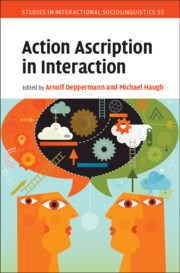Book contents
- Action Ascription in Interaction
- Studies in Interactional Sociolinguistics
- Action Ascription in Interaction
- Copyright page
- Contents
- Figures
- Tables
- Contributors
- Introduction
- 1 Action Ascription in Social Interaction
- Part I Constituents of Action Ascription
- Part II Practices of Action Ascription
- Part III Revisiting Action Ascription
- Book part
- Index
- References
1 - Action Ascription in Social Interaction
from Introduction
Published online by Cambridge University Press: 17 February 2022
- Action Ascription in Interaction
- Studies in Interactional Sociolinguistics
- Action Ascription in Interaction
- Copyright page
- Contents
- Figures
- Tables
- Contributors
- Introduction
- 1 Action Ascription in Social Interaction
- Part I Constituents of Action Ascription
- Part II Practices of Action Ascription
- Part III Revisiting Action Ascription
- Book part
- Index
- References
Summary
Action ascription can be understood from two broad perspectives. On one view, it refers to the ways in which actions constitute categories by which members make sense of their world, and forms a key foundation for holding others accountable for their conduct. On another view, it refers to the ways in which we accountably respond to the actions of others, thereby accomplishing sequential versions of meaningful social experience. In short, action ascription can be understood as matter of categorisation of prior actions or responding in ways that are sequentially fitted to prior actions, or both. In this chapter, we review different theoretical approaches to action ascription that have developed in the field, as well as the key constituents and resources of action ascription that have been identified in conversation analytic research, before going on to discuss how action ascription can itself be considered a form of social action.
Keywords
Information
- Type
- Chapter
- Information
- Action Ascription in Interaction , pp. 3 - 28Publisher: Cambridge University PressPrint publication year: 2022
References
Accessibility standard: Unknown
Why this information is here
This section outlines the accessibility features of this content - including support for screen readers, full keyboard navigation and high-contrast display options. This may not be relevant for you.Accessibility Information
- 9
- Cited by
